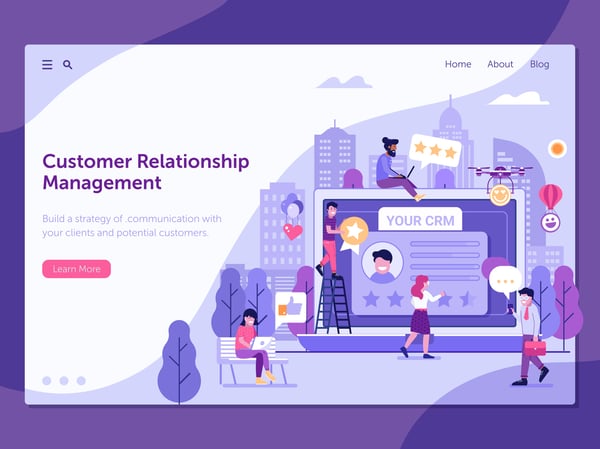Shopify is one of the most popular eCommerce platforms, and HubSpot is one of the most powerful tools for growing your business. Since introducing the world to inbound marketing strategies, HubSpot has revolutionized the way companies do business. As they continue to lead in this field, taking advantage of HubSpot's integration with Shopify makes sense for people who use that platform. In this post, we'll take a look at some things that make HubSpot a great fit with Shopify and who would benefit the most from integrating the two.
Things to Love About the HubSpot Shopify Integration
Although there is some overlap between them, HubSpot is actually made up of several product offerings. This allows users to get the features they need without paying for those they don't. For most Shopify users, all the offerings have some pretty great features. Let's take a look at the different products and the features they offer.
CRM

Customer relationship management is at the core of the HubSpot platform. Using data gathered about your customers and the power of machine learning, the software is able to supercharge your business outcomes. When the two are integrated, HubSpot will contain the data from your Shopify customers and orders as well as any contact records in the system to help it do its job. Although the list of HubSpot's CRM features is long, here are some standouts:
- Activity Streams — Contacts, Companies, and Deals are examples of the types of records that exist in HubSpot. HubSpot's CRM automatically logs the interactions people have with your website, emails, and other content. You can set up alerts to notify you when a contact performs an activity, such as viewing a particular page on your website.
- Customer Segmentation — Understanding your customers is a big part of selling to them. By using data about your customers to intelligently segment them into different buyer groups, you'll be able to create marketing personas that better target those groups.
- Better Personalization — On its own, HubSpot has powerful tools for personalized emails and other communications with customers. This forms a deeper connection with the customer and increases their trust in you. When combined with data from Shopify, it can utilize customer order history and more for even better personalization.
- Better Lead Nurturing — HubSpot helps with lead nurturing in three main ways. It can use automated abandoned cart recovery to get back customers who have filled their shopping cart without purchasing anything. It can use automated email to re-engage with customers at just the right time. Finally, it can help you improve the way you welcome new Shopify customers.
Marketing Hub
HubSpot will frequently mention that inbound marketing involves three phases: Attract, Engage, Delight. Marketing is the first of those three. The Marketing Hub will let you bring in more visitors in the hopes of turning them into leads that can be put through the sales funnel.
- Content Marketing — Content marketing is important to all three phases of inbound marketing. HubSpot's planning & strategy tools, and its use of topic clusters for blogs, makes it easy to dial in an effective content marketing plan that delivers organic traffic to your website.
- Automation — HubSpot is great at monitoring the behavioral events of your website visitors and email recipients. Through workflows, you can have HubSpot automatically respond to behaviors so that your outreach or content delivery happens at exactly the right time — when your prospects and customers want it.
- Landing Pages — Landings pages are often the first impression that customers will have of your online store. HubSpot's tools allow you to create landing pages that both look great and perform well.
- Ads — HubSpot's advertising tools will allow you to keep track of your advertising performance across several platforms. It will also let you use the power of its algorithms to target your ads to different audiences for maximum effectiveness.
- Email Marketing — We've already talked about how HubSpot can help you personalize your emails, but a good email requires more. Marketing Hub will help you create attractive emails that convert better.
Sales Hub
After you attract, it's time to engage customers and make a sales. HubSpot's Sales Hub is all about helping you do that more effectively.
- Lead Generation — HubSpot will help you identify qualified leads and reconnect with old leads, so that your sales efforts are spent on the people most likely to buy.
- Engagement — After leads are captured, HubSpot supports many ways to engage them. Online conferencing; video prospecting; event promotion and registration; messaging; in-app calling; meeting links; and more. You can also easily tag team members to assist in nurturing, cultivating, and closing deals.
- Pipeline Management — Tracking and managing a customer's journey through your sales funnel is the most important part of optimizing the buyer's journey. Sales Hub's pipeline management features make this easy.
- Quotes — With Sales Hub, you can generate quotes, have them followed up with through automation, and have your customers to convert the quotes into orders online and process online payments.
Service Hub
The final step of inbound marketing is delight. One of the best ways to delight your customers is through excellent customer service. That's what HubSpot's latest offering, Service Hub, is all about.
- Conversations — Customers like to connect in different ways. Email, live chat, phone calls. Everyone has a preference. Ordinarily, this can make it hard for support staff to keep track of everything. With Conversations, all of your communications are collected in one place for easy access.
- Support Tickets — When combined with your CRM to utilize customer and order data, tracking and managing customer support tickets becomes easier than ever. Your staff will have the information they need to respond to customer requests quickly.
- Knowledge Base — Use the knowledge base to store comprehensive help to commonly asked questions. The knowledge base reduces the load on your support staff, while improving service to your customers since it's available 24/7. If you do it right, it will complement your blog and multiply your organic traffic.
- Customer Feedback - A customer feedback system that integrates into the rest of HubSpot gives the platform even more of that data it needs to optimize your marketing, sales, and customer service efforts.
Another great feature of HubSpot is that it comes with powerful reporting tools that will track the results of most features the platform offers. These reports dashboards become an integral part of your business intelligence toolbox.
Types of Online Merchants Best Suited for HubSpot
You may have heard critics say that HubSpot isn't a good fit for e-Commerce merchants because it's too expensive. This isn't true for two reasons. First, there are free versions of all of the HubSpot products that provide many useful tools to businesses of any income level. Second, the assertion doesn't take into account the finances or business goals of the eCommerce operation.
While the free versions of HubSpot are great options for everyone, the paid versions will expand your access to more advanced features. HubSpot offers Starter, Professional, and Enterprise versions of its Marketing, Sales, and Service Hubs. You can be on different levels for each Hub to dial in exactly what benefits you the most.
The Professional versions are where the feature sets become really compelling. Checkout HubSpot's pricing and feature comparison page to learn about the features that are available at each level. One or more of the Professional plans will be beneficial to businesses that meet one or more of the following qualifications:
- Your average order is $1,000 or more; or your annual sales exceed $2 million.
- Your sales benefit from lead capture and nurturing.
- Executing and measuring the results of a digital marketing plan would help your business grow.
- Purchases made on your website often require the involvement of a salesperson or sales team.
- Automating tasks or workflows would enable better engagement with your prospects and customers; free your personnel up to focus on more impactful activities; or allow you to continue to grow without adding headcount.
- There's a need for marketing and sales alignment.
This is not an exhaustive list, and if you're unsure about whether an upgrade to HubSpot's premium products would benefit your business, you should talk to a qualified HubSpot Solutions Partner.
How to Get Started With HubSpot

If you're prone to tackling new things on your own, HubSpot has free versions of its products for you to try. Create a HubSpot account and make use of HubSpot's guide for using its Shopify integration.
If you'd prefer to have help and guidance from a HubSpot expert, seek out a HubSpot Solutions Partner. A HubSpot Solution Partner will identify which products and features will be the most beneficial to your business.
When to Involve a HubSpot Solutions Partner
Selling products online can be a difficult to master by yourself. Fortunately, HubSpot partners with digital marketing agencies and certifies them as HubSpot Solutions Partners. A HubSpot Solutions Partner can help you with the marketing aspects of your business while you focus on producing your products or running your day-to-day operations. If any of the following situations apply to you, it may be time to seek the help of a HubSpot Solutions Partner:
- You need help implementing HubSpot
- You want to create a digital marketing plan to grow your business
- You need help executing a digital marketing plan
One of our other blog posts, Reasons to Hire a Digital Marketing Agency, will give you some more insights into when you might want to ask for help.
About Eniture Technology
Eniture Technology specializes in helping e-Commerce merchants grow by providing useful information, digital marketing services, off-the-shelf apps that solve common problems, and custom programming services. Please contact us if you need help growing your online business or implementing the concepts presented in this blog post.
Interested in learning more? Start with our free guide on how to increase online sales, and subscribe to our blog!



